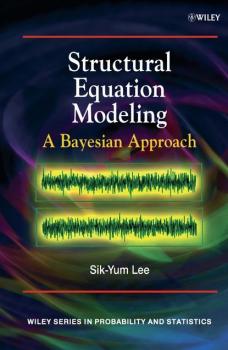Группа авторов
Список книг автора Группа авторовEmpirical Model Building
A hands-on approach to the basic principles of empirical model building. Includes a series of real-world statistical problems illustrating modeling skills and techniques. Covers models of growth and decay, systems where competition and interaction add to the complexity of the model, and discusses both classical and nonclassical data analysis methods.
Nonlinear Statistical Models
A comprehensive text and reference bringing together advances in the theory of probability and statistics and relating them to applications. The three major categories of statistical models that relate dependent variables to explanatory variables are covered: univariate regression models, multivariate regression models, and simultaneous equations models. Methods are illustrated with worked examples, complete with figures that display code and output.
Measurement Error Models
The Wiley-Interscience Paperback Series consists of selected books that have been made more accessible to consumers in an effort to increase global appeal and general circulation. With these new unabridged softcover volumes, Wiley hopes to extend the lives of these works by making them available to future generations of statisticians, mathematicians, and scientists. «The effort of Professor Fuller is commendable . . . [the book] provides a complete treatment of an important and frequently ignored topic. Those who work with measurement error models will find it valuable. It is the fundamental book on the subject, and statisticians will benefit from adding this book to their collection or to university or departmental libraries.» -Biometrics «Given the large and diverse literature on measurement error/errors-in-variables problems, Fuller's book is most welcome. Anyone with an interest in the subject should certainly have this book.» -Journal of the American Statistical Association «The author is to be commended for providing a complete presentation of a very important topic. Statisticians working with measurement error problems will benefit from adding this book to their collection.» -Technometrics « . . . this book is a remarkable achievement and the product of impressive top-grade scholarly work.» -Journal of Applied Econometrics Measurement Error Models offers coverage of estimation for situations where the model variables are observed subject to measurement error. Regression models are included with errors in the variables, latent variable models, and factor models. Results from several areas of application are discussed, including recent results for nonlinear models and for models with unequal variances. The estimation of true values for the fixed model, prediction of true values under the random model, model checks, and the analysis of residuals are addressed, and in addition, procedures are illustrated with data drawn from nearly twenty real data sets.
Multiple Time Series
The Wiley Series in Probability and Statistics is a collection of topics of current research interests in both pure and applied statistics and probability developments in the field and classical methods. This series provides essential and invaluable reading for all statisticians, whether in academia, industry, government, or research.
Mathematical Asset Management
A practical approach to the mathematical tools needed to increase portfolio growth, learn successful trading strategies, and manage the risks associated with market fluctuation Mathematical Asset Management presents an accessible and practical introduction to financial derivatives and portfolio selection while also acting as a basis for further study in mathematical finance. Assuming a fundamental background in calculus, real analysis, and linear algebra, the book uses mathematical tools only as needed and provides comprehensive, yet concise, coverage of various topics, such as: Interest rates and the connection between present value and arbitrage Financial instruments beyond bonds that serve as building blocks for portfolios Trading strategies and risk performance measures Stochastic properties of stock prices The difference between expected return and expected growth and the geometric Brownian motion Diversification through the creation of optimal portfolios under various constraints The use of the Capital Asset Pricing Model to accurately estimate the difference between the return of the market and the short rate To further demonstrate the reality of the discussed concepts, the author analyzes five active stocks over a four-year period and highlights the different methods and portfolios that exist in today's economic world. Exercises are also provided throughout the text, along with the solutions, allowing readers to measure their understanding of presented techniques as well as see how the methods work in real life. Mathematical Asset Management is an excellent book for courses in mathematical finance, actuarial mathematics, financial derivatives, and financial engineering at the upper-undergraduate and graduate levels. It is also a valuable reference for practitioners in banking, insurance, and asset management industries.
Margins of Error
Enhance the quality of survey results by recognizing and reducing measurement errors. Margins of Error: A Study of Reliability in Survey Measurement demonstrates how and hwy identifying the presence and extent of measurement errors in survey data is essential for improving the overall collection and analysis of the data. The author outlines the consequences of ignoring survey measurement errors and also discusses ways to detect and estimate the impact of these errors. This book also provides recommendations of improving the quality of survey data. Logically organized and clearly written, this book: Deconstructs the data gathering process into six main elements of the response process: question adequacy, comprehension, accessibility, retrieval, motivation, and communication Provides an exhaustive review of valuable reliability estimation techniques that can be applied to survey data Identifies the types of questions and interviewer practices that are essential to the collection of reliable data Addresses hypotheses regarding which survey questions, sources of information, and questionnaire formats produce the most reliable data In conjunction with research data gathered on nearly 500 survey measures and the application of an empirical approach grounded in classical measurement theory, this book discusses the sources of measurement error and provides the tools necessary for improving survey data collection methods. Margins of Error enables statisticians and researchers in the fields of public opinion and survey research to design studies that can detect, estimate, and reduce measurement errors that may have previously gone undetected. This book also serves as a supplemental textbook for both undergraduate and graduate survey methodology courses.
Modern Engineering Statistics
An introductory perspective on statistical applications in the field of engineering Modern Engineering Statistics presents state-of-the-art statistical methodology germane to engineering applications. With a nice blend of methodology and applications, this book provides and carefully explains the concepts necessary for students to fully grasp and appreciate contemporary statistical techniques in the context of engineering. With almost thirty years of teaching experience, many of which were spent teaching engineering statistics courses, the author has successfully developed a book that displays modern statistical techniques and provides effective tools for student use. This book features: Examples demonstrating the use of statistical thinking and methodology for practicing engineers A large number of chapter exercises that provide the opportunity for readers to solve engineering-related problems, often using real data sets Clear illustrations of the relationship between hypothesis tests and confidence intervals Extensive use of Minitab and JMP to illustrate statistical analyses The book is written in an engaging style that interconnects and builds on discussions, examples, and methods as readers progress from chapter to chapter. The assumptions on which the methodology is based are stated and tested in applications. Each chapter concludes with a summary highlighting the key points that are needed in order to advance in the text, as well as a list of references for further reading. Certain chapters that contain more than a few methods also provide end-of-chapter guidelines on the proper selection and use of those methods. Bridging the gap between statistics education and real-world applications, Modern Engineering Statistics is ideal for either a one- or two-semester course in engineering statistics.
Modern Experimental Design
A complete and well-balanced introduction to modern experimental design Using current research and discussion of the topic along with clear applications, Modern Experimental Design highlights the guiding role of statistical principles in experimental design construction. This text can serve as both an applied introduction as well as a concise review of the essential types of experimental designs and their applications. Topical coverage includes designs containing one or multiple factors, designs with at least one blocking factor, split-unit designs and their variations as well as supersaturated and Plackett-Burman designs. In addition, the text contains extensive treatment of: Conditional effects analysis as a proposed general method of analysis Multiresponse optimization Space-filling designs, including Latin hypercube and uniform designs Restricted regions of operability and debarred observations Analysis of Means (ANOM) used to analyze data from various types of designs The application of available software, including Design-Expert, JMP, and MINITAB This text provides thorough coverage of the topic while also introducing the reader to new approaches. Using a large number of references with detailed analyses of datasets, Modern Experimental Design works as a well-rounded learning tool for beginners as well as a valuable resource for practitioners.
Structural Equation Modeling
***Winner of the 2008 Ziegel Prize for outstanding new book of the year*** Structural equation modeling (SEM) is a powerful multivariate method allowing the evaluation of a series of simultaneous hypotheses about the impacts of latent and manifest variables on other variables, taking measurement errors into account. As SEMs have grown in popularity in recent years, new models and statistical methods have been developed for more accurate analysis of more complex data. A Bayesian approach to SEMs allows the use of prior information resulting in improved parameter estimates, latent variable estimates, and statistics for model comparison, as well as offering more reliable results for smaller samples. Structural Equation Modeling introduces the Bayesian approach to SEMs, including the selection of prior distributions and data augmentation, and offers an overview of the subject’s recent advances. Demonstrates how to utilize powerful statistical computing tools, including the Gibbs sampler, the Metropolis-Hasting algorithm, bridge sampling and path sampling to obtain the Bayesian results. Discusses the Bayes factor and Deviance Information Criterion (DIC) for model comparison. Includes coverage of complex models, including SEMs with ordered categorical variables, and dichotomous variables, nonlinear SEMs, two-level SEMs, multisample SEMs, mixtures of SEMs, SEMs with missing data, SEMs with variables from an exponential family of distributions, and some of their combinations. Illustrates the methodology through simulation studies and examples with real data from business management, education, psychology, public health and sociology. Demonstrates the application of the freely available software WinBUGS via a supplementary website featuring computer code and data sets. Structural Equation Modeling: A Bayesian Approach is a multi-disciplinary text ideal for researchers and students in many areas, including: statistics, biostatistics, business, education, medicine, psychology, public health and social science.
Tutorials in Biostatistics, Tutorials in Biostatistics
The Tutorials in Biostatistics have become a very popular feature of the prestigious Wiley journal, Statistics in Medicine (SIM). The introductory style and practical focus make them accessible to a wide audience including medical practitioners with limited statistical knowledge. This book represents the second of two volumes presenting the best tutorials published in SIM, focusing on statistical modeling of complex data. Topics include clustered data, hierarchical models, mixed models, genetic modeling, and meta-analysis. Each tutorial is focused on a medical problem, has been fully peer-reviewed and edited, and is authored by leading researchers in biostatistics. Many articles include an appendix on the latest developments since publication in the journal and additional references. This will appeal to statisticians working in medical research, as well as statistically-minded clinicians, biologists, epidemiologists and geneticists. It will also appeal to graduate students of biostatistics.









